Strike
A worker strike is a period of protest during which workers stand together and assert their collective bargaining rights when an employer refuses to treat them fairly. This action of the collective bargaining rights enforces more substantial labor legislation. Worker strikes usually involve the entire workforce, and it is a specific form of direct action adopted in defense of working rights. Strikes are either politically or economically motivated for the most part, with many labor disputes having both elements.
When it comes to traveling, a worker strike can significantly disrupt the journeys of individual travelers, and whether they are willing to risk the disruption, in order to support the strike, is completely voluntary. A worker strike can be triggered by a variety of issues concerning unfair working conditions or labor practices. Issues such as wages and hours, workplace safety, and health insurance are common causes of worker strikes. Whenever there is a dispute between labor and management, worker strikes are possible.
Strikes often cause major disruptions to transportation, both locally and internationally. On individual travel trips, a strike can cause cancellations, delays and extra expenses. Airplane, train and bus companies are all vulnerable to disruptions because of worker strikes. During strikes, several workers and pilots may refuse to draft duty rosters, resulting in a complete lack of flights, trains or buses.
In more extreme cases, worker strikes may spill out of the workplace and into the streets. In these cases, travelers may be forced to confront threatening crowds and rioters, as well as obstructing picketing workers. Aside from traveler safety concerns, strike-related traffic disruptions may cause delays in travelers reaching their intended destinations. As a result, many travelers will avoid travel during periods of labor dispute and worker strikes.
It is possible for travelers to plan for a worker strike and find other modes of transportation that are outside the reach of the negotiated labor dispute. For instance, travelers may choose to rent cars and drive to their destinations instead of take an airplane or train. Taxi and ridesharing services may also be an option as certain strikes may not affect them as something public transportation like a plane or train.
It’s important for travelers to do some research in order to plan for a potential worker strike. For instance, travelers should consult the websites of airline, bus, and train companies to check on the status of routes and negotiate alternate routes if needed. It is also important to ensure that travel insurance covers strike-related expenses and travel delays.
In some cases, it is also possible to support workers directly with a voluntary donation. Such donations, whether they are financial or in kind, are a way of showing solidarity with striking workers. It is important to remember that a majority of workers typically do not partake in strikes, preferring moderation to adamant protest. In most cases, they will be out of a job due to the strike and would need financial assistance. Supporting such workers allows them to also benefit from the ones instigating the strike.
When it comes to accomplishing their demands, strikers often have to take a more volatile approach. Anything from civil disruption to industrial sabotage may be employed. It is important to remember that it is the employer who will often respond to striker’s demands and not the government. In any case, travelers should stay abreast of strike developments and be aware of resulting impacts on their travel plans.
In conclusion, a worker strike constitutes a powerful form of direct action in which workers use their collective bargaining rights in order to enforce labor legislation. A worker strike can significantly disrupt travel, as it can result in delays and cancelled flights. Therefore, travelers should plan ahead to anticipate disruptions and should be aware of how their own actions can support the labor dispute or otherwise.
Airport strikes

Strike in Scotland

Strikes in Argentina

Strikes in Europe

Strikes in Iceland

Strikes in Peru

Strikes in the Netherlands

Boeing Strike Threatens Jet Supply Chain

Boeing defense strike vote could ripple into trans-Pacific travel

Edinburgh Bus Strike Threatens Fringe Festival Travel

Portugal Airport Strike Triggers Summer Baggage Delays

Europe Airport Strikes: Compensation and Re-Routing Guide
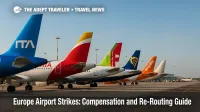
Palma de Mallorca Airport Strike Sparks Peak-Season Disruptions

Portugal airport strike: five summer weekends of disruption ahead

Air Canada Flight Attendants Launch Strike Vote Ahead of Mid-August Deadline

European Summer Flight Delays: The Math Behind the Crunch

Final Day of SATA Azores Strike Snarls Island Flights

Lima Transport Strike to Disrupt Independence Day Travel
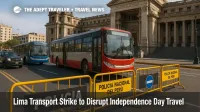
France Air Traffic Control Strike Update: Travel Impact
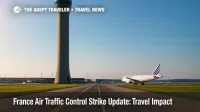
Palma Airport Protest Set to Disrupt Balearic Flights
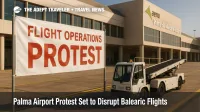
Italy Airport Strike to Disrupt Flights July 26

European Air Traffic Strikes Spark Summer Travel Chaos

French Air Traffic Controller Strike Grounds Over 1,000 Flights Across Europe

Palermo Airport Strike on July 11, 2025: What Travelers Need to Know
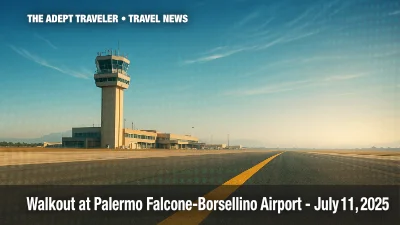
Major Italian airport walkouts threaten mid-summer travel on July 10, 2025

London Underground Strike Set for July 8-9: What Tube Riders Need to Know
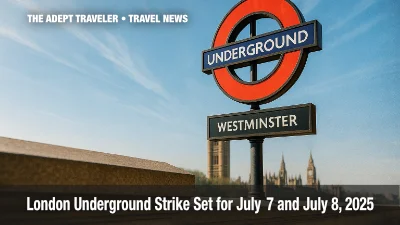
Italy Ferry Strike on July 5-6 2025: What Travelers Need to Know

KLM Strike on June 28: How to Avoid Disruption at Schiphol

Belgium Airport Strike Shuts Brussels and Charleroi on June 25

Italy National Strike Halts Trains and Flights June 19‑20
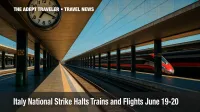
Louvre Strike Shuts Museum, Overtourism Crisis Deepens

Boeing Strike Tentative Deal: Implications for Travelers and Airlines

